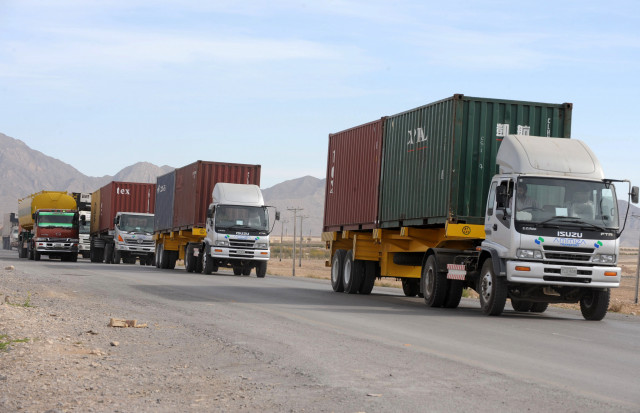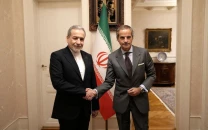US tests withdrawing military equipment through Pakistan
US official says they sent two convoys through Pakistan as a "test" on Sunday.

The US needs to move equipment in over 70,000 trucks and 120,000 containers. PHOTO: AFP/ FILE
The US military has started to withdraw equipment from Afghanistan through Pakistan ahead of next year's deadline for combat troops to leave the war against the Taliban, an official said Monday.
Two convoys, each hauling 25 shipping containers, entered Pakistan at the Chaman and Torkham border crossings on Sunday as part of the US redeployment of equipment from Afghanistan, US Lieutenant Colonel Les Carroll told AFP.
"The passage of these convoys marks the first US shipments from Afghanistan through Pakistan since July 2012," Carroll said.
Pakistan in July temporarily stopped NATO traffic after gunmen attacked NATO trucks, killing a driver, in the northwestern border town of Jamrud.
Islamabad also imposed a seven-month blockade on NATO traffic passing overland to Afghanistan after US air strikes killed 24 Pakistani soldiers on November 26, 2011.
Carroll told AFP that the two convoys had been sent through Pakistan as a "test" as the military decides how best to withdraw the huge amount of US and NATO equipment in Afghanistan, more than 11 years after a US-led invasion brought down the Taliban.
"There are still 100,000 men and 200 bases. Some of the equipment will stay (in Afghanistan), some of it will be redeployed," Carroll said.
"We have got to use any feasible way to do that. The northern route and of course air are other solutions."
Pakistani-US relations have now largely recovered and the outgoing US commander in Afghanistan, General John Allen, and his successor, General Joseph Dunford, on Thursday held talks with Pakistani army chief of staff, General Ashfaq Kayani.
The New York Times reported last month that in the next two years NATO forces are expected to remove about 70,000 vehicles and 120,000 shipping containers from Afghanistan, and the way out will require rail lines and well-surfaced roads.
Although Pakistan is the most efficient and cheapest route, the blockade and Pakistan's past demands for more money have made Western officials wary of over reliance on Islamabad.
The New York Times said officials in Uzbekistan have offered to provide a land route for equipment leaving northern Afghanistan if vehicles and military supplies can be left behind for them.
The so-called Northern Distribution Network accounts for just over 50 per cent of NATO cargo transport and 40 per cent for the United States, which also receives around 30 per cent of its supplies by air.
A Pakistani customs official in Jamrud said that Sunday's containers came from Bagram, the largest US-run air base in Afghanistan, and were trucked into Pakistan under tight security provided by paramilitary troops.
Hanif Khan Marwat, the president of the All Pakistan Goods Carriers Association, said the convoys were on their way to the port city of Karachi.
"The containers are carrying military equipment. This is the first time that such a big number of trucks are coming back to Karachi with NATO equipment," he said.


















COMMENTS
Comments are moderated and generally will be posted if they are on-topic and not abusive.
For more information, please see our Comments FAQ